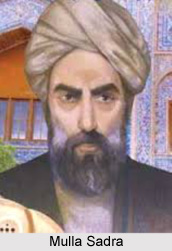 Islamic Philosophy is concerned with finding a balance between reason and faith. The relation between religion and philosophy is quite deeply ingrained in the Islamic tradition. Islamic theologians are of the opinion that there is no separate body of Islamic philosophy, and the nearest approach to it is the orthodox system of theology. Since all philosophy was ultimately based on the Holy Quran and Sunna, the theologians refused to accept philosophy as something distinct from religion. However, the philosophers claim that Islamic philosophy does indeed form a separate branch of study, distinct from theology. They advance a number of influences which went into the making of the Islamic philosophy and giving it shape. These influences include Greek philosophy, which the early Muslims came into contact with after the conquests of Alexandria, Syria and Jundishapur, pre-Islamic Indian Philosophy and Iranian philosophy. However, arguments notwithstanding, one aspect which clearly stands out is that Islamic Philosophy is clearly rooted in the religion, and conforms to the Quran, with its detailed analysis of the nature of reality and advice on how to live, and the practices of the Prophet, the Sunna.
Islamic Philosophy is concerned with finding a balance between reason and faith. The relation between religion and philosophy is quite deeply ingrained in the Islamic tradition. Islamic theologians are of the opinion that there is no separate body of Islamic philosophy, and the nearest approach to it is the orthodox system of theology. Since all philosophy was ultimately based on the Holy Quran and Sunna, the theologians refused to accept philosophy as something distinct from religion. However, the philosophers claim that Islamic philosophy does indeed form a separate branch of study, distinct from theology. They advance a number of influences which went into the making of the Islamic philosophy and giving it shape. These influences include Greek philosophy, which the early Muslims came into contact with after the conquests of Alexandria, Syria and Jundishapur, pre-Islamic Indian Philosophy and Iranian philosophy. However, arguments notwithstanding, one aspect which clearly stands out is that Islamic Philosophy is clearly rooted in the religion, and conforms to the Quran, with its detailed analysis of the nature of reality and advice on how to live, and the practices of the Prophet, the Sunna.
As far as India is concerned, it is a land of several religions and beliefs. Thus Islamic philosophy entered the country with the coming of religion itself. Islamic philosophy has been seen to have developed in two distinct phases, broadly the early and later phase. These are briefly discussed below.
Early Islamic Philosophy
The early stage of Islamic philosophy covers the era between the 8th and 12th centuries, known as the `Islamic Golden Age.` Two distinct philosophical currents can be seen during this time - the Kalam and the Falsafa. Kalam dealt mostly with Islamic theological questions. They adopted a rational and dialectic approach in dealing with philosophical questions and interpreting the Quran. The Falsafa based their religious interpretations on a number of external influences, such as Aristotelianism and Neoplatonism. For this reason they were considered as highly unorthodox. Prominent in this second stream was the school of Avicennism and Averroism.
Later Islamic philosophy
Later Islamic Philosophy saw a pre-dominance being given to logic, and the consequent integration of logic into the teachings of the Madrasah. During this time, philosophical activity considerably lessened in the western Islamic countries, though they persisted in the eastern Islamic countries. It was during this period that a number of religious schools arose, and these are still active in the Islamic world.

Islamic Philosophical Schools
Among the various Islamic schools of philosophy, the most important ones are- Illuminationist Philosophy (Hikmat al Ishraq), Transcendent Theosophy (Hikmat Mutaaliah), Sufi philosophy and Traditionalist School.
Illuminationist philosophy
This school of Islamic philosophy is a combination of ancient Iranian philosophy with Avicenna`s philosophy. A number of innovative ideas were introduced into the discipline by its founder Shahab al Din Suhrawardi. This school is said to be influenced by Neoplatonism. One of the biggest achievements of this school is the idea of `decisive necessity` developed by Suhrawardi while refuting the Greek logic.
Transcendent Theosophy
This school was founded by Mulla Sadra in the 17th century. It made remarkable headway in providing a philosophical viewpoint when discussing the nature of reality. Sadra`s contribution in bringing about the transition from essentialism to existentialism is believed to be immense. This was the belief that existence is more important than essence since something has to exist first before it can acquire any essence.
Sufi Philosophy
Sufi philosophy essentially deals with the mysticism present in Islam. The philosophical traditions of Sufism are associated with Sunni and Shia Islam. Sufi philosophy, like all other major philosophical traditions, has several sub-branches including metaphysics and cosmology as well as several unique concepts. It basically deals with the ways to achieve complete union with the Almighty and the ecstasy gained from such union.
Traditionalist School
 This school of Islamic philosophy is also known as Integral Traditionalism or Perennialism. Integral Tradition does not have a human origin and may be considered as principles revealed from Heaven and binding man to his divine origin, or to what was called a `transcendent unity`. Perennialists claim that the historically separated traditions share not only the same divine origin but are based on the same metaphysical principles, sometimes called Philosophia Perennis.
This school of Islamic philosophy is also known as Integral Traditionalism or Perennialism. Integral Tradition does not have a human origin and may be considered as principles revealed from Heaven and binding man to his divine origin, or to what was called a `transcendent unity`. Perennialists claim that the historically separated traditions share not only the same divine origin but are based on the same metaphysical principles, sometimes called Philosophia Perennis.
Islamic philosophy in the current scenario is still an active component of Islam. A number of philosophers have continued to discuss and debate the philosophical aspects of Islam, and in this context, a major contribution was made by Allama Muhammad Iqbal. He brought about a great Islamic philosophy in India in the 20th century. His work `The Reconstruction of Religious Thought in Islam` is a milestone in the modern political philosophy of Islam. Other major Islamic philosophers who have enriched the field of Islamic philosophy in contemporary times are Riaz Ahmed Gohar Shahi, Ayatullah Ruhollah Khomeini, Murtaza Motahhari, Sayyid Abul Ala Maududi, Fazlur Rahman, Javed Ahmad Ghami and many others.












